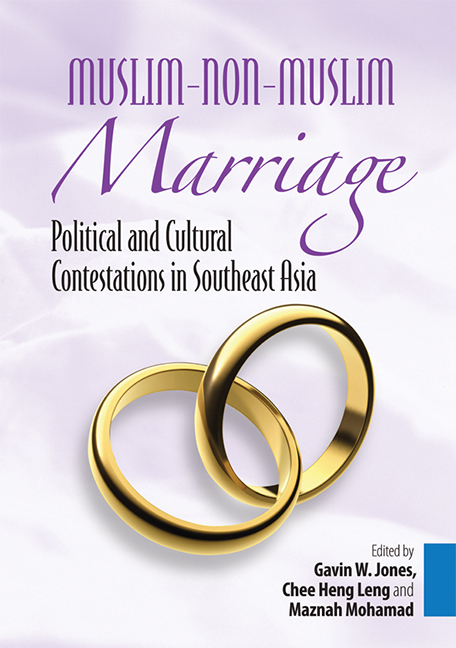Book contents
- Frontmatter
- Contents
- Preface
- The Contributors
- Glossary
- Introduction
- SECTION I Political and Legal Contestations
- SECTION II Lived Realities
- Chapter 6 “Not Muslim, not Minangkabau”: Interreligious Marriage and its Cultural Impact in Minangkabau Society
- Chapter 7 Khao Khaek: Interfaith Marriage between Muslims and Buddhists in Southern Thailand
- Chapter 8 Interethnic Marriages and Conversion to Islam in Kota Bharu
- SECTION III Perspectives
- Index
Chapter 8 - Interethnic Marriages and Conversion to Islam in Kota Bharu
from SECTION II - Lived Realities
Published online by Cambridge University Press: 21 October 2015
- Frontmatter
- Contents
- Preface
- The Contributors
- Glossary
- Introduction
- SECTION I Political and Legal Contestations
- SECTION II Lived Realities
- Chapter 6 “Not Muslim, not Minangkabau”: Interreligious Marriage and its Cultural Impact in Minangkabau Society
- Chapter 7 Khao Khaek: Interfaith Marriage between Muslims and Buddhists in Southern Thailand
- Chapter 8 Interethnic Marriages and Conversion to Islam in Kota Bharu
- SECTION III Perspectives
- Index
Summary
INTRODUCTION
Malaysia is a multi-ethnic country of which the population is constitutionally divided in two large groups, namely the bumiputera, comprising Malays, Orang Asli, and indigenous groups in Sarawak and Sabah, with special rights; and non-bumiputera encompassing other ethnic groups. In the negotiations leading to Independence, special privileges were granted to the first group in exchange for citizenship rights for the latter group. This has been enshrined in Article 153 of the Constitution, and can be seen as a social contract to maintain the delicate unity that the British colonial legacy left the independent post-colonial government. Ethnically based economic divisions, and the threat of a minority position for bumiputera, who were generally seen to be socio-economically deprived, contributed to a rather fragile unity (Andaya and Andaya 2001, pp. 273–87; Hitam 2001; Ling- Chien Neo 2006, p. 96).
Despite these preventive measures, twenty years later the multi-ethnic unity was threatened when ethnic riots broke out in the bigger cities, as a manifestation of socio-economic inequalities and the accompanying politicization. In response, the government implemented the New Economic Policy (NEP) to reduce economic inequality and poverty and lessen the identification of ethnicity with economic function. After more than thirty years, this has created a more equalized socio-economic position of the ethnic groups, which is often seen as a prerequisite for intergroup contact.
Paradoxically, though, the constitutional definition of Malay in Article 160, as being someone who habitually speaks Malay, professes Islam, adheres to Malay customs, and is domiciled in Malaysia or Singapore, has resulted in a strong fusion of Malay with Muslim; subsequently Islam is seen as preordained for Malays. Accompanying measures to foster ethnic harmony, as in the case of the NEP, have, in addition to this religious ascription, resulted in a strengthened group feeling and competition, which can decrease intergroup contact. The different institutions that have been established to deal with the different ethnic backgrounds on social, economic, judicial, and educational matters have ensued in a stronger emphasis on group identity. Scholars have, therefore, referred to the country as plural (Fenton 2003), and the state as ethnocratic (Haque 2003) or based on a form of consociationalism (Brown 1994; Trezzini 2001).
- Type
- Chapter
- Information
- Muslim-Non-Muslim MarriagePolitical and Cultural Contestations in Southeast Asia, pp. 219 - 252Publisher: ISEAS–Yusof Ishak InstitutePrint publication year: 2009

